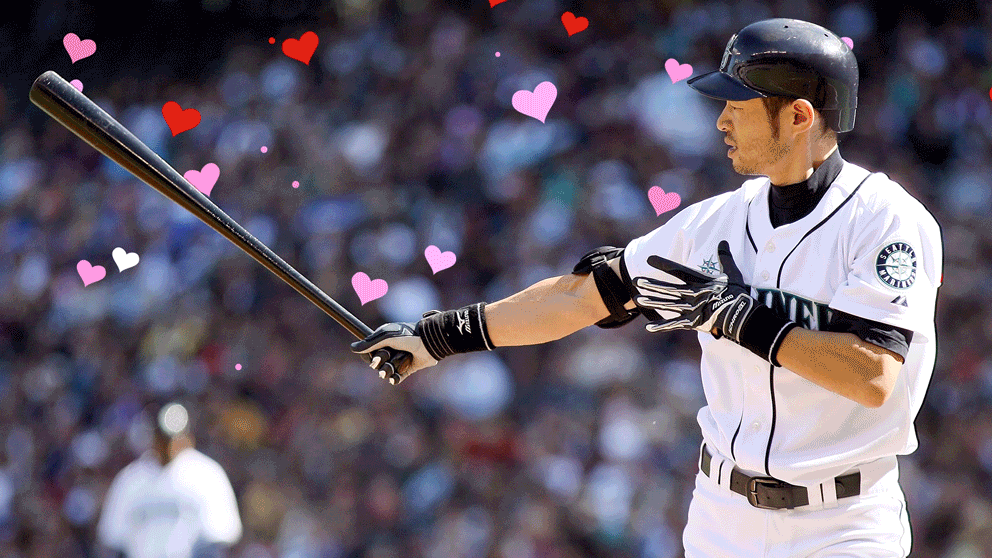All products are independently selected by our editors. If you buy something, we may earn an affiliate commission.
The press release is layered in so much stilted, sanitized corporatespeak that, if you were to read it quickly, you might not realize that it heralds the de facto end of Ichiro Suzuki's playing carer. The 44-year-old outfielder is "transitioning to a new role," the Mariners announced on Thursday, in which he will act as a sort of quasi–player-coach, working out with the team and mentoring its younger players by day but switching to street clothes by night. The arrangement is effective immediately, and it precludes him from returning to the active roster in 2018. Ichiro's agent insists that he is not retiring, but he might not have a choice. It is unlikely that he plays in a Major League Baseball game again.
This feels like an abrupt goodbye, especially for a man who won two batting titles, appeared in ten All-Star Games, and will enter the Hall of Fame as his sport's true hit king. Reading the effusive, eulogistic praise heaped on him by Mariners GM Jerry Dipoto somehow made the news seem even more bittersweet. "We really don't want him to change anything that he’s doing right now, with the exception that he will not be playing in games," Dipoto said in what was probably meant as a compliment but didn't come off like one. Given that the perennially hapless Mariners are in the middle of a six-game spring homestand, it feels a little cruel for the franchise to clean out his locker without giving him a courtesy farewell plate appearance and the chance for a curtain call or six.
Ichiro was never going to go out like that, though, largely because Ichiro, if he had his way, might never go out in the first place. A haunting ESPN The Magazine feature followed him as he trained alone in a snowy stadium in Japan last winter, holding out hope for one more major-league offer in the U.S. He has expressed a desire to play until age 50. "I think I'll just die," he said in 2017 when a Miami newspaper broached the subject of retirement. “When I start using a cane, that’s a time that I think I should retire,” he reiterated on Thursday. Since childhood, his life's work has been maximizing his body's capacity to play baseball. He keeps playing, in part, because he doesn't care to do anything else.
No Japanese non-pitcher had ever appeared in an MLB game when Ichiro made his Seattle debut in 2001, and as foolish as it may seem in retrospect, some combination of ignorance and jingoism prompted many Stateside observers to wonder if a Japanese position player—even a three-time MVP—would be able to succeed against American competition. Ichiro proved those people to be braying morons, spraying 242 hits en route to Rookie of the Year honors and his fourth MVP award as a professional. In his eighth game, when fans were still trying to figure out who this guy was and whether he was any good, he caught Terrence Long at third with a throw that somehow traced a perfectly straight line from Ichiro's hand to the exact baseball-sized spot between the bag and Long's hapless, sliding foot. (The play was the subject of a New York Times mini-profile 11 years after it took place.)
No one ran on Ichiro after that.
What I will remember most about watching him, though, is that at a time when baseball was dominated by chemically enhanced behemoths who clubbed moonshots to the next area code, Ichiro's game was made of a different kind of magic. He played like no one American baseball fans had ever seen: At his peak, he possessed a Curry-like ability to alter the geometry of the playing field the moment he stepped to the plate. That easy, inside-out, tennis-racket swing allowed him to transition seamlessly from crouching in the batter's box to flying up the line, which meant that even his routine ground balls became fledgling infield hits.
You know how the crowd buzzes when Steph gets a switch and starts dancing behind the three-point line, and then crescendos to a roar by the time his shot cracks through the net? That was Safeco Field every time Ichiro slapped a high chopper to short. His presence on the basepaths had a delightful way of short-circuiting the brains of terrified infielders, rending useless the carefully calibrated internal clocks they employed to measure the time they had to make an out. Players responsible for Ichiro's batted balls routinely fumbled the transfer or sailed their throws, earning him two bases for the effort of one. Sometimes they would just slump their shoulders and flip the ball back to the pitcher, relieved to have kept him in the infield, at least, and uninterested in finding out just how many steps by which he'd beat their pitiable throw to first.
No matter what base he arrived at, and no matter how spectacular the means that got him there, Ichiro never varied his routine after each at-bat: He would remove his black elbow brace, hand it to the nearest base coach, and undo and redo the Velcro straps on his batting gloves, often more than once, while waiting for play to resume. His expression remained the same, too—not bored, exactly, but never unduly enamored with his latest accomplishment, either. To him, playing baseball was just his job. The only thing he cared about, then and always, was doing it better than anyone else.






